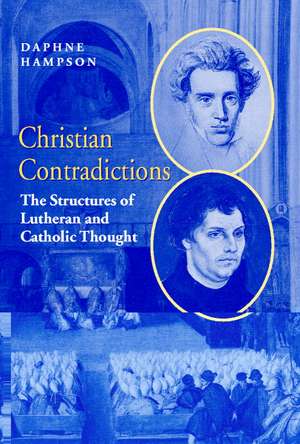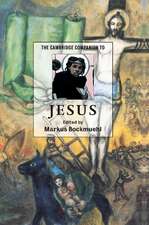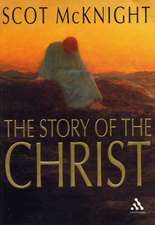Christian Contradictions: The Structures of Lutheran and Catholic Thought
Autor Daphne Hampsonen Limba Engleză Hardback – 25 mar 2001
| Toate formatele și edițiile | Preț | Express |
|---|---|---|
| Paperback (1) | 339.75 lei 6-8 săpt. | |
| Cambridge University Press – 10 mar 2004 | 339.75 lei 6-8 săpt. | |
| Hardback (1) | 423.37 lei 6-8 săpt. | |
| Cambridge University Press – 25 mar 2001 | 423.37 lei 6-8 săpt. |
Preț: 423.37 lei
Preț vechi: 475.69 lei
-11% Nou
Puncte Express: 635
Preț estimativ în valută:
81.01€ • 84.81$ • 67.03£
81.01€ • 84.81$ • 67.03£
Carte tipărită la comandă
Livrare economică 05-19 aprilie
Preluare comenzi: 021 569.72.76
Specificații
ISBN-13: 9780521450607
ISBN-10: 0521450608
Pagini: 336
Ilustrații: 3 b/w illus.
Dimensiuni: 164 x 237 x 26 mm
Greutate: 0.59 kg
Ediția:00003
Editura: Cambridge University Press
Colecția Cambridge University Press
Locul publicării:Cambridge, United Kingdom
ISBN-10: 0521450608
Pagini: 336
Ilustrații: 3 b/w illus.
Dimensiuni: 164 x 237 x 26 mm
Greutate: 0.59 kg
Ediția:00003
Editura: Cambridge University Press
Colecția Cambridge University Press
Locul publicării:Cambridge, United Kingdom
Cuprins
Preface; Note on the text; Introduction; 1. Luther's revolution; 2. The Catholic alternative; 3. Catholic incomprehension; 4. Nygren's detractors; 5. Ecumenical encounter; 6. Dialogue with Bultmann; 7. Kierkegaard's odyssey; Epilogue; Bibliography; Index of names; Index of subjects.
Recenzii
'In this well researched and scholarly work, Daphne Hampson argues that Catholicism and Lutheranism are totally incompatible. It is a remarkably generous exposition of both forms of Christianity: not pseudo-neutral but wonderfully sympathetic all round. This is an important book - a radical challenge to decades of ecumenical rapprochement.' Fergus Kerr
'This is a fascinating, original, readable and challenging book. Ecumenists and students of the Reformation should read it, but so should other serious Christians. It is rare for a theological book to be so spiced with passion … it matters for [Hampson] what people think and what they do with their beliefs.' Mark D. Chapman, The Journal of Theological Studies
'Daphne Hampson traces one of the great fissures in western Christian thought, rejecting all attempts to paper it over, insisting that the most fundamental questions of understanding the self in relation to God are at stake in it. Here is a post-Christian theologian sympathetically engaging with the Lutheran and Catholic traditions, while also defining her own position over against them. This is very interesting reading, and an important book not least because it shows how significant the issues it discusses remain.' Richard Bauckham
'Daphne Hampson shows how different 'structures of thought' affect how Lutheran and Catholic theologies use key theological terms. By analyzing a wide range of materials she argues that these structures become deterrents to ecumenical consensus. In the course of her analysis she examines diverse authors in the Lutheran and Catholic traditions from the sixteenth to the twentieth centuries. Hampson's own position outside Christianity does not impair her theological acumen and empathy, but does provide a critical edge to some of her important judgments.' James M. Gustafson, Emeritus Professor, Emory University
'Particular strengths are the clarity of her exposition, the making available of important material not often covered outside of Roman Catholic contexts (e.g. sixteenth-century material) and her willingness not to step back from the subject-matter of her book.' Clive Marsh, Modern Believing
'Daphne Hampson provides a clear account of the divergent structuring of thought about man in relation to God that emerged at the Reformation, and of the failure of the prevailing Catholic tradition to understand Luther's own starting point … makes for a compelling read.' Reformation
'In this book Daphne Hampson deploys her formidable intellectual skills in an analysis of the broad divisions between Catholic and Lutheran forms of life and thought … demonstrating how deeply this disagreement cuts and how much getting to the bottom of it matters.' J. A. DiNoia, editor of The Thomist
'This book is timely.' The Expository Times
'… an interesting and challenging book …' Pacifica
'This is a fascinating, original, readable and challenging book. Ecumenists and students of the Reformation should read it, but so should other serious Christians. It is rare for a theological book to be so spiced with passion … it matters for [Hampson] what people think and what they do with their beliefs.' Mark D. Chapman, The Journal of Theological Studies
'Daphne Hampson traces one of the great fissures in western Christian thought, rejecting all attempts to paper it over, insisting that the most fundamental questions of understanding the self in relation to God are at stake in it. Here is a post-Christian theologian sympathetically engaging with the Lutheran and Catholic traditions, while also defining her own position over against them. This is very interesting reading, and an important book not least because it shows how significant the issues it discusses remain.' Richard Bauckham
'Daphne Hampson shows how different 'structures of thought' affect how Lutheran and Catholic theologies use key theological terms. By analyzing a wide range of materials she argues that these structures become deterrents to ecumenical consensus. In the course of her analysis she examines diverse authors in the Lutheran and Catholic traditions from the sixteenth to the twentieth centuries. Hampson's own position outside Christianity does not impair her theological acumen and empathy, but does provide a critical edge to some of her important judgments.' James M. Gustafson, Emeritus Professor, Emory University
'Particular strengths are the clarity of her exposition, the making available of important material not often covered outside of Roman Catholic contexts (e.g. sixteenth-century material) and her willingness not to step back from the subject-matter of her book.' Clive Marsh, Modern Believing
'Daphne Hampson provides a clear account of the divergent structuring of thought about man in relation to God that emerged at the Reformation, and of the failure of the prevailing Catholic tradition to understand Luther's own starting point … makes for a compelling read.' Reformation
'In this book Daphne Hampson deploys her formidable intellectual skills in an analysis of the broad divisions between Catholic and Lutheran forms of life and thought … demonstrating how deeply this disagreement cuts and how much getting to the bottom of it matters.' J. A. DiNoia, editor of The Thomist
'This book is timely.' The Expository Times
'… an interesting and challenging book …' Pacifica
Notă biografică
Descriere
A thorough historical and theological exploration of the incompatibility of Lutheranism and Catholicism.
















